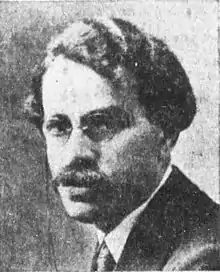Gregory Zilboorg
Gregory Zilboorg (Russian: Григорий Зильбург, Ukrainian: Григорій Зільбург) (December 25, 1890 – September 17, 1959) was a psychoanalyst and historian of psychiatry who is remembered for situating psychiatry within a broad sociological and humanistic context in his many writings and lectures.

Life and career
Zilboorg was born in Kiev, Ukraine on December 25, 1890 and studied medicine in St. Petersburg, where he worked under Vladimir Bekhterev.[1] In 1917, after the February Revolution, he served in the Ministry of Labor for two prime ministers (Aleksandr Kerenskii and Georgii L'vov).
Zilboorg emigrated to the United States in 1919 and for a time supported himself by translating literature from Russian to English while studying medicine at Columbia University. Among the works he translated is Evgenii Zamiatin's novel We.[2]
After graduating in 1926, he worked at the Bloomingdale Hospital and eventually established a psychoanalytic practice in New York City, having first been analysed in Europe by Franz Alexander.[3] From the 1930s onward, Zilboorg produced several volumes of lasting importance on the history of psychiatry. The Medical Man and the Witch During the Renaissance began as the Noguchi lectures at Johns Hopkins University in 1935. This volume was followed by A History of Medical Psychology in 1941 and Sigmund Freud in 1951. He also produced a series of clinical articles, on subjects from the schizoid personality to postpartum depression[4] - he considered the latter as rooted in ambivalence over motherhood and latent sadism[3] - and explored the effects of unresolved conflicts and countertransference affects of the analyst in the analytic situation.[5]
Zilboorg's patients included George Gershwin, Lillian Hellman,[6] Ralph Ingersoll, Edward M.M. Warburg, Marshall Field, Kay Swift and James Warburg. The musical Lady in the Dark is reportedly based on Moss Hart's experience undergoing analysis with Zilboorg. He examined Ernest Hemingway, Thomas Merton, and other noted writers.[7] Zilboorg married Ray Liebow in 1919 and they had two children (Nancy and Gregory, Jr.). He married Margaret Stone in 1946 and they had three children (Caroline, John and Matthew). His niece was cellist Olga Zilboorg.
Citing Susan Quinn,[8]:342 author Ron Chernow[9]:346 reports that Zilboorg engaged in unethical behavior including financial exploitation of patients. In an interview with Chernow, Edward M. M. Warburg reported that Zilboorg asked him for cash gifts and in one instance, a mink coat for his wife.[9]:347
Zilboorg was a convert to Roman Catholicism.[7]
Literary Archives
Zilboorg's papers at the Beinecke Rare Book and Manuscript Library, Yale University, contain manuscripts of several of his publications as well as his personal correspondence with Margaret Stone Zilboorg.
Bibliography
Writings
- The passing of the old order in Europe (1920)
- The medical man and the witch during the renaissance (1935)
- A history of medical psychology (1941)
- Mind, Medicine, & Man (1943)
- Sigmund Freud (1951)
- Psychology of the criminal act and punishment (1954)
- Psychoanalysis and Religion (1962)
Translations
- He Who Gets Slapped by Leonid Andreyev, translated from the Russian with an introduction (1921)
- We by Yevgeny Zamyatin, translated from the Russian (1924)
- The criminal, the judge and the public; a psychological analysis by Franz Alexander and Hugo Staub, translated from the German (1931)
- Outline of clinical psychoanalysis by Otto Fenichel, translated by Bertram D. Lewin and Gregory Zilboorg (1934)
References
- M. Stern, Frightful Stages (2014) p. 42
- R. Philmus, Visions and Re-Visions (2005) p. 317
- M. Stern, Frightful Stages (2014) p. 43
- Otto Fenichel, The Psychoanalytic Theory of Neurosis (1946) p. 446, p. 426 and p. 703
- H. Ruitenbeek ed., The Analytic Situation (1973) p. 10 and p. 141
- W. Wright, 'Lilian Helman (2000) p. 170
- "Thomas Merton's Pilgrimage". December 16, 1984 – via www.washingtonpost.com.
- Quinn, Susan (1987). A Mind of Her Own. Simon and Schuster.
- Chernow, Ron (1993). The Warburgs. Vintage.
Further reading
- Gregory Zilboorg Papers. Yale Collection of American Literature, Beinecke Rare Book and Manuscript Library. (Finding aid).
External links
- Works by Gregory Zilboorg at Project Gutenberg
- Works by or about Gregory Zilboorg at Internet Archive
- Gregory Zilboorg Papers. Yale Collection of American Literature, Beinecke Rare Book and Manuscript Library.